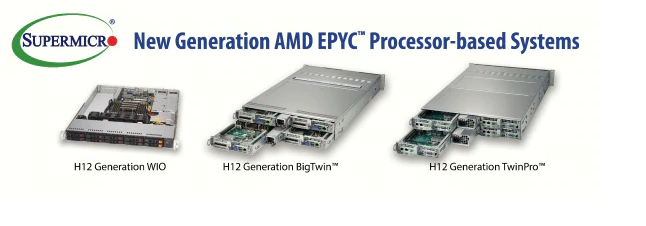Supermicro Now Offering AMD EPYC‚ĄĘ 7002 Series Processor-based Systems to Customers Who Want to Transform Their Data Centers
SAN JOSE, Calif., August 7, 2019 ‚ÄĒ Super Micro Com¬≠pu¬≠ter, Inc. (SMCI), a glo¬≠bal lea¬≠der in enter¬≠pri¬≠se com¬≠pu¬≠ting, sto¬≠rage, net¬≠wor¬≠king solu¬≠ti¬≠ons, and green com¬≠pu¬≠ting tech¬≠no¬≠lo¬≠gy, today laun¬≠ched its first fami¬≠ly of new H12 gene¬≠ra¬≠ti¬≠on A+ Ser¬≠vers opti¬≠mi¬≠zed to deli¬≠ver a new level of inte¬≠gra¬≠ti¬≠on and supe¬≠ri¬≠or per¬≠for¬≠mance for modern dat¬≠a¬≠cen¬≠ters with AMD EPYC‚ĄĘ 7002 Series Processors.
Supermicro‚Äôs new H12 A+ ser¬≠vers with the 2nd Gen AMD EPYC‚ĄĘ pro¬≠ces¬≠sors are expec¬≠ted to deli¬≠ver up to two times the per¬≠for¬≠mancei with dou¬≠ble the core count com¬≠pared to 1st Gen AMD EPYC‚ĄĘ pro¬≠ces¬≠sor-based sys¬≠tems. With the¬≠se new A+ Ser¬≠vers, cus¬≠to¬≠mers can also expect impro¬≠ved GPU acce¬≠le¬≠ra¬≠tor per¬≠for¬≠mance as well as up to four times the peak FLOPS per socket.ii
Super¬≠mi¬≠cro deli¬≠ver¬≠ed world-record per¬≠for¬≠mance bench¬≠marks on its new H12 A+ Ser¬≠vers for both TPCx-IoT, and TPC-DS cate¬≠go¬≠ries. For TPCx-IoT, per¬≠for¬≠mance of 472200.88 IoTps was estab¬≠lished on Supermicro‚Äôs H12 Twin¬≠Pro‚ĄĘ 2U 4‚ÄĎnode ser¬≠ver whe¬≠re fas¬≠ter IoT gate¬≠way data ana¬≠ly¬≠tics are cri¬≠ti¬≠cal for the coming explo¬≠si¬≠on of IoT device num¬≠bers. This is espe¬≠ci¬≠al¬≠ly with the mas¬≠si¬≠ve band¬≠width increase enab¬≠led by 5G net¬≠works. A new world record for TPC-DS was achie¬≠ved using a Super¬≠mi¬≠cro H12 A+ BigT¬≠win sys¬≠tem. This ser¬≠ver deli¬≠vers the hig¬≠hest per¬≠for¬≠mance and lowest per¬≠for¬≠mance per dol¬≠lar for a 10TB data¬≠ba¬≠se with 64% hig¬≠her Qph¬≠DS through¬≠put (Com¬≠po¬≠si¬≠te Query per Hour Metric) and $0.05 savings per Qph¬≠DS over the pre¬≠vious world record holders.
‚ÄúSupermicro‚Äôs indus¬≠try-lea¬≠ding H12 A+ ser¬≠vers lever¬≠aging AMD‚Äôs EPYC 7002 series pro¬≠ces¬≠sors pro¬≠vi¬≠de an ide¬≠al com¬≠bi¬≠na¬≠ti¬≠on of fea¬≠tures for modern data cen¬≠ters inclu¬≠ding robust vir¬≠tua¬≠liza¬≠ti¬≠on per¬≠for¬≠mance, up to 64 high-per¬≠for¬≠mance cores per socket, a maxi¬≠mum of 128 threads per socket, and onboard disk con¬≠trol¬≠lers to miti¬≠ga¬≠te memo¬≠ry access bot¬≠t¬≠len¬≠ecks,‚ÄĚ said Ismail Sayee¬≠dud¬≠din, Cor¬≠po¬≠ra¬≠te Vice Pre¬≠si¬≠dent, Sales and Busi¬≠ness Ope¬≠ra¬≠ti¬≠ons. ‚ÄúSupermicro‚Äôs H12 A+ ser¬≠vers are available in mul¬≠ti¬≠ple opti¬≠mi¬≠zed con¬≠fi¬≠gu¬≠ra¬≠ti¬≠ons and sto¬≠rage den¬≠si¬≠ties to address cus¬≠to¬≠mer requirements.‚ÄĚ
‚ÄúWe‚Äôre exci¬≠ted and thank¬≠ful to have our part¬≠ners sup¬≠port¬≠ing the launch of AMD EPYC 7002 Series Pro¬≠ces¬≠sors,‚ÄĚ said Scott Aylor, cor¬≠po¬≠ra¬≠te vice pre¬≠si¬≠dent and gene¬≠ral mana¬≠ger, Dat¬≠a¬≠cen¬≠ter Solu¬≠ti¬≠ons Group, AMD. ‚ÄúTheir EPYC based solu¬≠ti¬≠ons are poi¬≠sed to deli¬≠ver a new stan¬≠dard for modern dat¬≠a¬≠cen¬≠ter cus¬≠to¬≠mers. With twice the cores, breakth¬≠rough per¬≠for¬≠mance and embedded secu¬≠ri¬≠ty fea¬≠tures, all deli¬≠ver¬≠ed by a lea¬≠der¬≠ship archi¬≠tec¬≠tu¬≠re, cus¬≠to¬≠mers can trans¬≠form their dat¬≠a¬≠cen¬≠ter ope¬≠ra¬≠ti¬≠ons at the pace of their business.‚ÄĚ
Fur¬≠ther¬≠mo¬≠re, the¬≠se new Super¬≠mi¬≠cro A+ Ser¬≠vers offer increased data cen¬≠ter agi¬≠li¬≠ty and respon¬≠si¬≠ve¬≠ness with a com¬≠pre¬≠hen¬≠si¬≠ve and balan¬≠ced fea¬≠ture set of I/O, memo¬≠ry, and secu¬≠ri¬≠ty capa¬≠bi¬≠li¬≠ties. As the first gene¬≠ra¬≠ti¬≠on of sys¬≠tems with PCI‚ÄĎE¬ģ 4.0 sup¬≠port, the¬≠se A+ Ser¬≠vers fea¬≠ture a lar¬≠ge memo¬≠ry foot¬≠print of up to four tera¬≠bytes (4TB) per socket run¬≠ning fast DDR4 memo¬≠ry up to 3200MHz.
Super¬≠mi¬≠cro offers an indus¬≠try-lea¬≠ding port¬≠fo¬≠lio of AMD EPYC‚ĄĘ based sys¬≠tems and Ser¬≠ver Buil¬≠ding Block Solu¬≠ti¬≠ons¬ģ. From sin¬≠gle-socket main¬≠stream and WIO ser¬≠vers to high-end Ultra ser¬≠ver sys¬≠tems and mul¬≠ti-node sys¬≠tems, inclu¬≠ding BigT¬≠win‚ĄĘ and Twin¬≠Pro‚ĄĘ, Super¬≠mi¬≠cro enables cus¬≠to¬≠mers to build appli¬≠ca¬≠ti¬≠on-opti¬≠mi¬≠zed solu¬≠ti¬≠ons with a multi¬≠tu¬≠de of con¬≠fi¬≠gu¬≠ra¬≠ti¬≠on possibilities.
The¬≠se new 2nd Gen AMD EPYC‚ĄĘ pro¬≠ces¬≠sors are also socket com¬≠pa¬≠ti¬≠ble with Super¬≠mi¬≠cro H11 gene¬≠ra¬≠ti¬≠on sys¬≠tems (drop-in sup¬≠port for board rev 2.x). This pro¬≠vi¬≠des new and exis¬≠ting cus¬≠to¬≠mers on the H11 gen sys¬≠tems a fast upgrade track when PCI‚ÄĎE¬ģ 4.0 sup¬≠port is not a neces¬≠si¬≠ty. Exis¬≠ting Super¬≠mi¬≠cro H11 solu¬≠ti¬≠ons are still uni¬≠que¬≠ly com¬≠pe¬≠ti¬≠ti¬≠ve in the mar¬≠ket as they can sup¬≠port up to DDR4-3200MHz memo¬≠ry.iii
For com­ple­te infor­ma­ti­on on Super­mi­cro pro­ducts, visit www.supermicro.com.
Fol­low Super­mi­cro on Face­book and Twit­ter to recei­ve their latest news and announcements.
About Super Micro Com­pu­ter, Inc. (NASDAQ: SMCI)
Super¬≠mi¬≠cro (NASDAQ: SMCI), the lea¬≠ding inno¬≠va¬≠tor in high-per¬≠for¬≠mance, high-effi¬≠ci¬≠en¬≠cy ser¬≠ver tech¬≠no¬≠lo¬≠gy is a pre¬≠mier pro¬≠vi¬≠der of advan¬≠ced ser¬≠ver Buil¬≠ding Block Solu¬≠ti¬≠ons¬ģ for Data Cen¬≠ter, Cloud Com¬≠pu¬≠ting, Enter¬≠pri¬≠se IT, Hadoop/Big Data, HPC and Embedded Sys¬≠tems world¬≠wi¬≠de. Super¬≠mi¬≠cro is com¬≠mit¬≠ted to pro¬≠tec¬≠ting the envi¬≠ron¬≠ment through its ‚ÄúWe Keep IT Green¬ģ‚ÄĚ initia¬≠ti¬≠ve and pro¬≠vi¬≠des cus¬≠to¬≠mers with the most ener¬≠gy-effi¬≠ci¬≠ent, envi¬≠ron¬≠men¬≠tal¬≠ly-fri¬≠end¬≠ly solu¬≠ti¬≠ons available on the market.
Super­mi­cro, Buil­ding Block Solu­ti­ons and We Keep IT Green are trade­marks and/or regis­tered trade­marks of Super Micro Com­pu­ter, Inc.
All other brands, names and trade­marks are the pro­per­ty of their respec­ti­ve owners.
Media Cont­act:
Greg Kaufman
Super Micro Com­pu­ter, Inc.
pr@supermicro.com
SMCI‚ÄĎF
i Pro¬≠jec¬≠tions as of July 3, 2019 for AMD EPYC pro¬≠ces¬≠sors using com¬≠pu¬≠ter mode¬≠ling of pre¬≠pro¬≠duc¬≠tion parts and SPE¬≠Cra¬≠te¬ģ 2017_int_base inter¬≠nal test¬≠ing results. Results may vary with pro¬≠duc¬≠tion sili¬≠con test¬≠ing. EPYC 7601 results as of June 2019 http://spec.org/cpu2017/results/res2019q2/cpu2017-20190411‚Äď11817.pdf. SPEC¬ģ, SPE¬≠Cra¬≠te¬ģ and SPEC CPU¬ģ are regis¬≠tered trade¬≠marks of the Stan¬≠dard Per¬≠for¬≠mance Eva¬≠lua¬≠ti¬≠on Cor¬≠po¬≠ra¬≠ti¬≠on. See www.spec.org for more infor¬≠ma¬≠ti¬≠on. ROM-23
ii Esti¬≠ma¬≠ted gene¬≠ra¬≠tio¬≠nal increase based upon AMD inter¬≠nal design spe¬≠ci¬≠fi¬≠ca¬≠ti¬≠ons for ‚ÄúZen 2‚ÄĚ com¬≠pared to ‚ÄúZen‚ÄĚ. ‚ÄúZen 2‚ÄĚ has 2X the core den¬≠si¬≠ty of ‚ÄúZen‚ÄĚ, and when mul¬≠ti¬≠pli¬≠ed by 2X peak FLOPs per core, at the same fre¬≠quen¬≠cy, results in 4X the FLOPs in through¬≠put. Actu¬≠al results with pro¬≠duc¬≠tion sili¬≠con may vary.
iii Some sup¬≠port¬≠ed fea¬≠tures and func¬≠tion¬≠a¬≠li¬≠ty of second gene¬≠ra¬≠ti¬≠on AMD EPYC‚ĄĘ pro¬≠ces¬≠sors (code¬≠na¬≠med ‚ÄúRome‚ÄĚ) requi¬≠re a BIOS update from your ser¬≠ver manu¬≠fac¬≠tu¬≠rer when used with a mother¬≠board desi¬≠gned for the first gene¬≠ra¬≠ti¬≠on AMD EPYC 7000 series pro¬≠ces¬≠sor. A mother¬≠board desi¬≠gned for ‚ÄúRome‚ÄĚ pro¬≠ces¬≠sors is requi¬≠red to enable all available func¬≠tion¬≠a¬≠li¬≠ty. ROM-06

